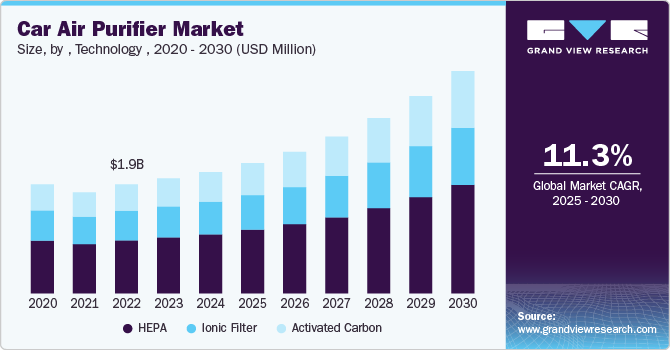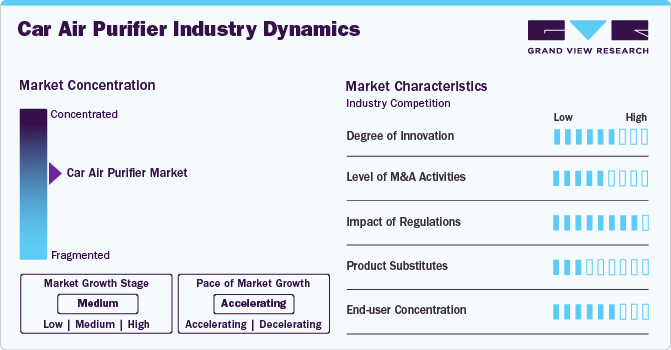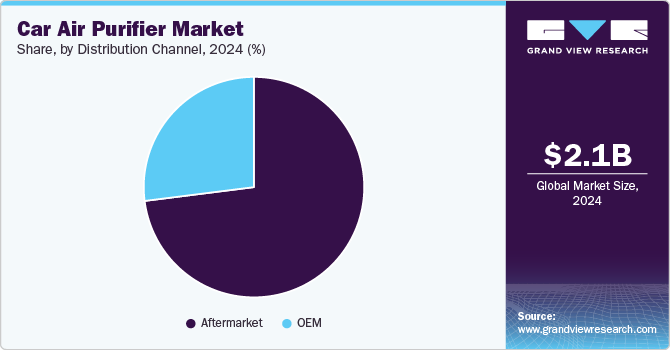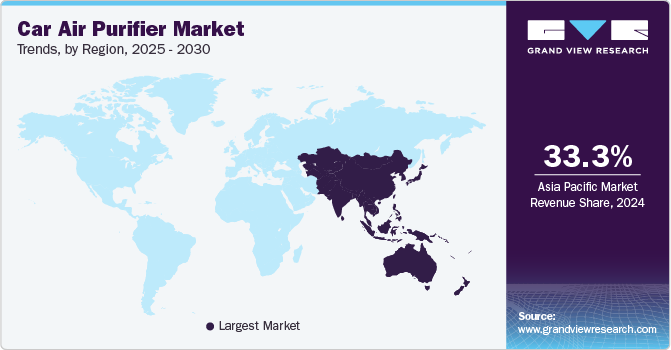- Home
- »
- Advanced Interior Materials
- »
-
Car Air Purifier Market Size & Share, Industry Report, 2030GVR Report cover
![Car Air Purifier Market Size, Share & Trends Report]()
Car Air Purifier Market (2025 - 2030) Size, Share & Trends Analysis Report By Technology (HEPA, Activated Carbon), By Type (Purifier), By Vehicle Type (Luxury Vehicle), By Distribution Channel (Aftermarket), By Region, And Segment Forecasts
- Report ID: GVR-4-68040-516-1
- Number of Report Pages: 90
- Format: PDF
- Historical Range: 2018 - 2023
- Forecast Period: 2025 - 2030
- Industry: Advanced Materials
- Report Summary
- Table of Contents
- Interactive Charts
- Methodology
- Download FREE Sample
-
Download Sample Report
Car Air Purifier Market Summary
The global car air purifier market size was estimated at USD 2,171.0 million in 2024 and is projected to reach USD 3,979.0 million by 2030, growing at a CAGR of 11.3% from 2025 to 2030. The market is experiencing significant growth, driven primarily by the increasing awareness of air pollution and its adverse health effects.
Key Market Trends & Insights
- The Asia pacific led the market and accounted for a revenue share of 33.3% in 2024.
- Based on technology, the HEPA segment accounted for a revenue share of 48.8% in 2024.
- Based on type, the purifier segment accounted for a revenue share of 47.9% in 2024.
- Based on vehicle type, the luxury segment accounted for a revenue share of 52.0% in 2024.
- Based on distribution channel, the aftermarket segment accounted for a revenue share of 73.0% in 2024.
Market Size & Forecast
- 2024 Market Size: USD 2,171.0 Million
- 2030 Projected Market Size: USD 3,979.0 Million
- CAGR (2025-2030): 11.3%
- Asia pacific: Largest market in 2024
As urbanization expands and vehicle emissions rise, more consumers are seeking solutions to improve the air quality inside their vehicles. Air purifiers help reduce allergens, pollutants, and harmful gases, making them highly sought after by individuals with respiratory issues or those who spend considerable time in traffic.
Moreover, the growing adoption of advanced automotive technologies is further driving the market expansion. With more vehicles being equipped with smart features, the integration of air purification systems has become a desirable add-on for consumers looking for enhanced comfort and well-being. The increasing availability of compact, efficient, and easy-to-use purifiers has also contributed to their popularity, particularly among tech-savvy consumers. Furthermore, regulatory pressures aimed at reducing in-vehicle pollution and the development of eco-friendly products are prompting automotive manufacturers to explore cleaner air solutions, thereby expanding the market for car air purifiers.
Market Concentration & Characteristics
The car air purifier market is characterized by moderate industry concentration, with a mix of established brands and emerging players. Major automotive accessory manufacturers and well-known consumer electronics companies dominate the market. These players often offer a wide range of air purifiers, featuring various sizes, technologies, and capabilities, to cater to diverse customer needs. However, there is a growing presence of startups and niche players who focus on specific customer segments, such as eco-conscious consumers or those seeking premium, high-tech features. The competition in the market is intensifying as both large corporations and smaller companies work to differentiate their products based on performance, technology, and pricing.
One key characteristic of the car air purifier market is its emphasis on innovation and technological advancements. Many manufacturers are incorporating advanced filtration systems, such as HEPA filters, activated carbon filters, and UV-C light technology, to enhance the purification process. Smart features, including air quality monitoring, smartphone connectivity, and real-time air quality updates, are becoming increasingly common in car air purifiers. The integration of these technologies is appealing to consumers who seek both effectiveness and convenience, driving product differentiation and increased consumer demand.

Another important feature of the market is its growing focus on health and well-being. As consumers become more aware of the potential health risks associated with in-vehicle air pollution, manufacturers are placing a greater emphasis on offering purifiers that target allergens, bacteria, viruses, and harmful gases. Additionally, car air purifiers are often marketed as a solution to mitigate the effects of poor indoor air quality on individuals with allergies, asthma, or other respiratory conditions. This health-centric approach has helped expand the consumer base beyond car enthusiasts to include health-conscious individuals and those with medical needs.
The car air purifier market is also influenced by global environmental trends and regulatory pressures. Many consumers opt for eco-friendly purifiers that use sustainable materials and low-energy technologies. Furthermore, as governments continue to implement stricter emission standards for vehicles, there is growing pressure for automakers to integrate cleaner air solutions within their vehicles. This trend has led to partnerships between automotive manufacturers and air purification companies to develop in-car air purification systems that comply with environmental standards while delivering superior air quality. These trends suggest that the market will continue to evolve in response to both consumer preferences and regulatory demands.
Drivers, Opportunities & Restraints
The car air purifier market is primarily driven by increasing concerns over air quality and health. With rising urbanization, traffic congestion, and vehicle emissions, consumers are becoming more aware of the impact poor air quality can have on their health. Car air purifiers offer a solution that removes allergens, pollutants, and harmful gases. This makes them a sought-after product for individuals with respiratory conditions and those spending long hours in traffic. Additionally, the growing demand for smart and tech-integrated car accessories is fueling the adoption of advanced air purifiers equipped with features like real-time air quality monitoring and smartphone connectivity.
Despite growing demand, the car air purifier market faces certain challenges, such as the relatively high cost of advanced air purifiers and limited consumer awareness in some regions. Many high-quality purifiers, which include HEPA filters, UV-C lights, and smart functionalities, can be expensive, which may deter budget-conscious consumers. Furthermore, the market is hindered by the lack of standardization in product offerings and certifications, which can create confusion among consumers and hinder their purchasing decisions. Additionally, some consumers may view air purifiers as non-essential, which can slow down mass adoption.
The car air purifier market holds significant opportunities for growth, particularly with the increasing integration of purifiers into new vehicles. As automakers explore advanced in-car air quality solutions in response to both consumer demand and regulatory pressures, partnerships between air purifier manufacturers and automotive companies can unlock new business avenues. Additionally, the growing popularity of electric vehicles (EVs) presents an opportunity to offer air purifiers that align with eco-friendly consumer values. There is also potential in emerging markets, where rising disposable incomes and urbanization are driving the adoption of advanced car accessories, including air purifiers.
Technology Insights
The HEPA technology segment accounted for a revenue share of 48.8% in 2024. The growing trend of incorporating HEPA filters in car air purifiers is driven by their ability to effectively trap microscopic particles, such as dust, pollen, and pet dander, that can contribute to allergies and respiratory issues. As consumers become more health-conscious and aware of the risks associated with poor air quality, HEPA filters are increasingly seen as an essential feature in car air purifiers. These filters are known for their high filtration efficiency, capable of capturing up to 99.97% of particles as small as 0.3 microns. With rising concerns over air pollution and its impact on health, especially in urban areas with heavy traffic, car owners are prioritizing air purifiers that offer superior filtration.
The growing trend of using activated carbon in car air purifiers stems from its ability to efficiently absorb odors, volatile organic compounds (VOCs), and harmful gases like formaldehyde and benzene, which are commonly found in vehicle interiors. As consumers become more aware of the negative health effects of indoor air pollution, activated carbon has gained popularity due to its effectiveness in improving air quality by neutralizing unpleasant smells and toxic substances.
Type Insights
The purifier type segment accounted for a revenue share of 47.9% in 2024. These purifiers often combine multiple filtration technologies, such as HEPA filters, activated carbon, and UV-C light, to target a wide range of airborne contaminants, including dust, allergens, bacteria, viruses, and harmful gases. With consumers becoming more health-conscious and concerned about indoor air quality, particularly in vehicles where ventilation can be limited, purifiers that offer comprehensive protection are gaining popularity.
Hybrid purifiers combine the advantages of various technologies, such as combining HEPA filters with activated carbon or ionizers, to deliver superior air quality. This trend is particularly appealing as hybrid models offer enhanced performance, removing both particulate matter and gaseous pollutants more efficiently. Additionally, these hybrid purifiers are often designed to be more compact and energy-efficient, catering to the growing demand for smart, space-saving solutions that don’t compromise on effectiveness. As consumers look for high-performance air purifiers with advanced features, hybrid types are becoming increasingly popular, offering a holistic approach to air purification in cars.
Vehicle Type Insights
The luxury vehicle type segment accounted for a revenue share of 52.0% in 2024. In the luxury vehicle segment, the demand for car air purifiers is being driven by the increasing focus on premium in-car experiences. Luxury car owners prioritize advanced comfort, health, and well-being features, and air purifiers are becoming a key component of this experience. Manufacturers are offering high-end air purifiers with advanced technologies such as HEPA filters, UV-C light, and smart features like real-time air quality monitoring and integration with the car’s infotainment system. These premium purifiers not only improve air quality but also enhance the overall driving experience by providing cleaner, fresher air, making them highly sought after by affluent consumers who expect top-tier features in their vehicles.
On the other hand, in the economical vehicle segment, the car air purifier market is expanding due to growing consumer awareness of air pollution and health concerns, even in budget-conscious consumers. As urbanization increases, many affordable vehicles are incorporating basic yet effective air purifiers to attract health-conscious buyers. These purifiers often focus on essential filtration technologies, such as activated carbon and HEPA filters, offering a more affordable solution to combat allergens, dust, and smoke in cars.
Distribution Channel Insights
The aftermarket distribution channel segment accounted for a revenue share of 73.0% in 2024. In the aftermarket distribution channel for the car air purifier market, consumers are increasingly seeking standalone purifiers that can be easily added to their existing vehicles. These purifiers are typically available through a wide range of retail outlets, both online and offline, including automotive accessory stores, e-commerce platforms, and electronics retailers.

In contrast, the OEM distribution channel focuses on integrating car air purifiers directly into new vehicle models at the manufacturing stage. Automotive manufacturers are increasingly offering air purification systems as factory-installed options, especially in premium and high-end vehicles. OEM systems are typically designed to seamlessly integrate with the car’s existing HVAC system, offering a more streamlined solution for customers.
Regional Insights
Asia pacific led the market and accounted for a revenue share of 33.3% in 2024. Asia Pacific represents one of the fastest-growing regions for the car air purifier market, driven by rapid urbanization, increased vehicle ownership, and rising pollution levels, particularly in major cities like New Delhi, Beijing, and Jakarta. As air quality in many parts of Asia Pacific continues to decline, consumers are actively seeking solutions to improve in-car air quality.

China car air purifier market held the largest revenue share in the Asia Pacific market. China's car air purifier market is expanding rapidly due to the country's high levels of air pollution, especially in urban areas. As vehicle ownership grows and air quality concerns rise, Chinese consumers are increasingly turning to car air purifiers to improve in-car air quality and reduce exposure to harmful pollutants.
The car air purifier market in India is expected to grow at a CAGR of 12.4% from 2025 to 2030. In India, the car air purifier market is growing rapidly due to worsening air pollution, particularly in metropolitan cities like Delhi and Mumbai. As urbanization and vehicle ownership rise, consumers are becoming more aware of the health risks associated with poor air quality inside vehicles. There is a rising demand for both affordable and efficient air purifiers, especially among middle-class consumers.
The car air purifier market in North America is experiencing steady growth due to rising concerns about air quality and the increasing prevalence of respiratory issues such as asthma and allergies. Consumers in the region are becoming more health-conscious and are actively seeking ways to improve in-car air quality.
U.S. Car Air Purifier Market Trends
The car air purifier market in the U.S. is expected to grow at a CAGR of 10.8% from 2025 to 2030. In the U.S., the car air purifier market is expanding rapidly as consumers are more focused on wellness and interior air quality. The rise in long commutes, traffic congestion, and pollution in major cities has driven interest in air purifiers that can address pollutants, allergens, and airborne viruses. The increasing adoption of smart technologies in vehicles is also contributing to this trend, as U.S. consumers look for purifiers with enhanced filtration systems and connectivity features.
The car air purifier market in the Canada is expected to grow at a CAGR of 11.2% from 2025 to 2030. In Canada, the market for car air purifiers is growing steadily, with increasing awareness about air pollution, particularly in large urban centers such as Toronto and Vancouver. The demand is driven by consumers seeking to protect themselves from environmental pollutants and allergens, especially during the spring and fall seasons when pollen and dust levels peak.
Europe Car Air Purifier Market Trends
Europe’s car air purifier market is seeing significant growth, fueled by stringent regulations on vehicle emissions and a strong cultural focus on environmental and health-conscious products. Countries in Europe are prioritizing clean air initiatives, making air purifiers a sought-after feature in cars. Consumers are increasingly inclined to purchase advanced air purifiers with multiple filtration stages, such as HEPA and activated carbon, to tackle particulate matter and harmful gases.
Germany car air purifier market held 29.5% share in the European market. In Germany, the car air purifier market is expanding due to the country's strong automotive industry and commitment to sustainable transportation. German consumers are highly aware of air pollution, particularly in densely populated cities like Berlin and Frankfurt, and are opting for air purifiers that offer superior filtration and environmental benefits.
UK car air purifier market is driven by increased public concern over air quality in urban areas and the government’s focus on reducing pollution levels. With rising levels of traffic emissions, UK consumers are actively seeking ways to protect themselves from harmful pollutants, making car air purifiers a popular choice.
Middle East & Africa Car Air Purifier Market Trends
In the Middle East and Africa, the car air purifier market is gaining momentum as air quality concerns grow, especially in cities like Dubai, Cairo, and Riyadh. Extreme weather conditions, such as high levels of dust and sandstorms, contribute to poor air quality, prompting consumers to seek air purifiers. The growing automotive market and increasing interest in premium vehicles with advanced features are further driving the demand.
In Saudi Arabia car air purifier market is witnessing demand rise due to the country's ongoing urbanization and the frequent occurrence of dust storms that affect air quality. Consumers are becoming more health-conscious, seeking air purifiers that can help reduce allergens, dust, and other harmful pollutants inside their vehicles.
Latin America Car Air Purifier Market Trends
In Latin America, the car air purifier market is witnessing gradual growth, driven by increasing awareness of air pollution and rising health concerns. Cities like Mexico City and São Paulo, which suffer from high levels of air pollution, are seeing an increased demand for air purifiers in vehicles.
Brazil car air purifier market is expanding, especially in urban areas where air pollution levels are high due to vehicle emissions and industrial activities. As Brazilian consumers become more health-conscious, the demand for in-car air purification systems is growing, particularly in cities like São Paulo and Rio de Janeiro. There is also an increasing interest in air purifiers that combine functionality with affordability.
Key Car Air Purifier Company Insights
Some of the key players operating in the market include Honeywell International, Sharp Electronics Corporation among others.
-
Honeywell International is a global technology and manufacturing conglomerate that operates across diverse industries, including aerospace, building technologies, safety, and performance materials. Known for its innovation in air quality solutions, Honeywell offers a range of advanced air purifiers and filtration systems. The company focuses on sustainability and energy efficiency, leveraging its expertise in automation and IoT to develop smart air quality products. Honeywell's commitment to environmental health and safety drives its strong presence in the air purifier market.
-
Sharp Electronics Corporation is a leading Japanese multinational company known for its consumer electronics, home appliances, and business solutions. Sharp is recognized for its innovative air purifiers, particularly in the consumer segment, using advanced technologies such as Plasmacluster ion technology to improve air quality. The company emphasizes quality and reliability in its products, offering efficient filtration systems that cater to both residential and commercial needs. Sharp’s air purifiers are widely popular for their high-performance capabilities and energy-efficient designs.
Key Car Air Purifier Companies:
The following are the leading companies in the car air purifier market. These companies collectively hold the largest market share and dictate industry trends.
- Honeywell International
- Sharp Electronics Corporation
- Panasonic Corporation
- Eureka Forbes
- Shenzhen Agcen Environmental Protection Tech Co
- Koninklijke Philips NV
- Airbus Electronic Technology Co Ltd
- BlueAir
- 3M
- Denso Corporation
Recent Developments
-
In November 2024, Ambrane introduced the AeroBliss Auto, a portable two-in-one car air purifier and aroma diffuser created to tackle growing air pollution issues in metropolitan areas. The AeroBliss Auto is designed to enhance in-car air quality with its 4-layer filtration system, while also offering an aroma pad for essential oils.
Car Air Purifier Market Report Scope
Report Attribute
Details
Market size value in 2025
USD 2,332.8 million
Revenue forecast in 2030
USD 3,979.0 million
Growth rate
CAGR of 11.3% from 2025 to 2030
Base year for estimation
2024
Historical data
2018 - 2023
Forecast period
2025 - 2030
Quantitative units
Revenue in USD million and CAGR from 2025 to 2030
Report coverage
Revenue forecast, company market position analysis, competitive landscape, growth factors, and trends
Segments covered
Technology, type, vehicle type, distribution channel, region
Regional scope
North America; Europe; Asia Pacific; Latin America; and Middle East & Africa
Country Scope
U.S.; Canada; Mexico; Germany; France; Italy; Spain; UK; China; India; Japan; South Korea; Australia; Brazil; Argentina; Saudi Arabia; UAE; South Africa
Key companies profiled
Honeywell International; Sharp Electronics Corporation; Panasonic Corporation; Eureka Forbes; Shenzhen Agcen Environmental Protection Tech Co; Koninklijke Philips NV; Airbus Electronic Technology Co Ltd; BlueAir; 3M; Denso Corporation
Customization scope
Free report customization (equivalent up to 8 analysts working days) with purchase. Addition or alteration to country, regional & segment scope.
Pricing and purchase options
Avail customized purchase options to meet your exact research needs. Explore purchase options
Global Car Air Purifier Market Report Segmentation
This report forecasts revenue growth at global, regional & country levels and provides an analysis on the industry trends in each of the sub-segments from 2018 to 2030. For this study, Grand View Research has segmented the car air purifier market based on technology, type, vehicle type, distribution channel, and region:
-
Technology Outlook (Revenue, USD Million, 2018 - 2030)
-
HEPA
-
Activated Carbon
-
Ionic Filter
-
-
Type Outlook (Revenue, USD Million, 2018 - 2030)
-
Purifier
-
Ionizer
-
Hybrid
-
-
Vehicle Type Outlook (Revenue, USD Million, 2018 - 2030)
-
Economical Vehicle
-
Medium Range
-
Luxury Vehicle
-
-
Distribution Channel Outlook (Revenue, USD Million, 2018 - 2030)
-
Aftermarket
-
OEM
-
-
Regional Outlook (Revenue, USD Million, 2018 - 2030)
-
North America
-
U.S.
-
Canada
-
Mexico
-
-
Europe
-
Germany
-
UK
-
France
-
Italy
-
Spain
-
-
Asia Pacific
-
China
-
India
-
Japan
-
Australia
-
South Korea
-
-
Latin America
-
Brazil
-
Argentina
-
-
Middle East & Africa
-
Saudi Arabia
-
UAE
-
South Africa
-
-
Frequently Asked Questions About This Report
b. The global car air purifier market size was estimated at USD 2,171.0 million in 2024 and is expected to reach USD 2,332.8 million in 2025.
b. The global car air purifier market, in terms of revenue, is expected to grow at a compound annual growth rate of 11.3% from 2025 to 2030 and reach USD 3,979.0 million by 2030.
b. The luxury vehicle type segment accounted for a revenue share of 52.0% in 2024. In the luxury vehicle segment, the demand for car air purifiers is being driven by the increasing focus on premium in-car experiences. Luxury car owners prioritize advanced comfort, health, and well-being features, and air purifiers are becoming a key component of this experience.
b. Some of the key players operating in the car air purifier market include Honeywell International, Sharp Electronics Corporation , Panasonic Corporation, Eureka Forbes, Shenzhen Agcen Environmental Protection Tech Co, Koninklijke Philips NV, Airbus Electronic Technology Co Ltd, BlueAir, 3M, Denso Corporation.
b. The car air purifier market is experiencing significant growth, driven primarily by the increasing awareness of air pollution and its adverse health effects.
Share this report with your colleague or friend.
Need a Tailored Report?
Customize this report to your needs — add regions, segments, or data points, with 20% free customization.

ISO 9001:2015 & 27001:2022 Certified
We are GDPR and CCPA compliant! Your transaction & personal information is safe and secure. For more details, please read our privacy policy.
Trusted market insights - try a free sample
See how our reports are structured and why industry leaders rely on Grand View Research. Get a free sample or ask us to tailor this report to your needs.










